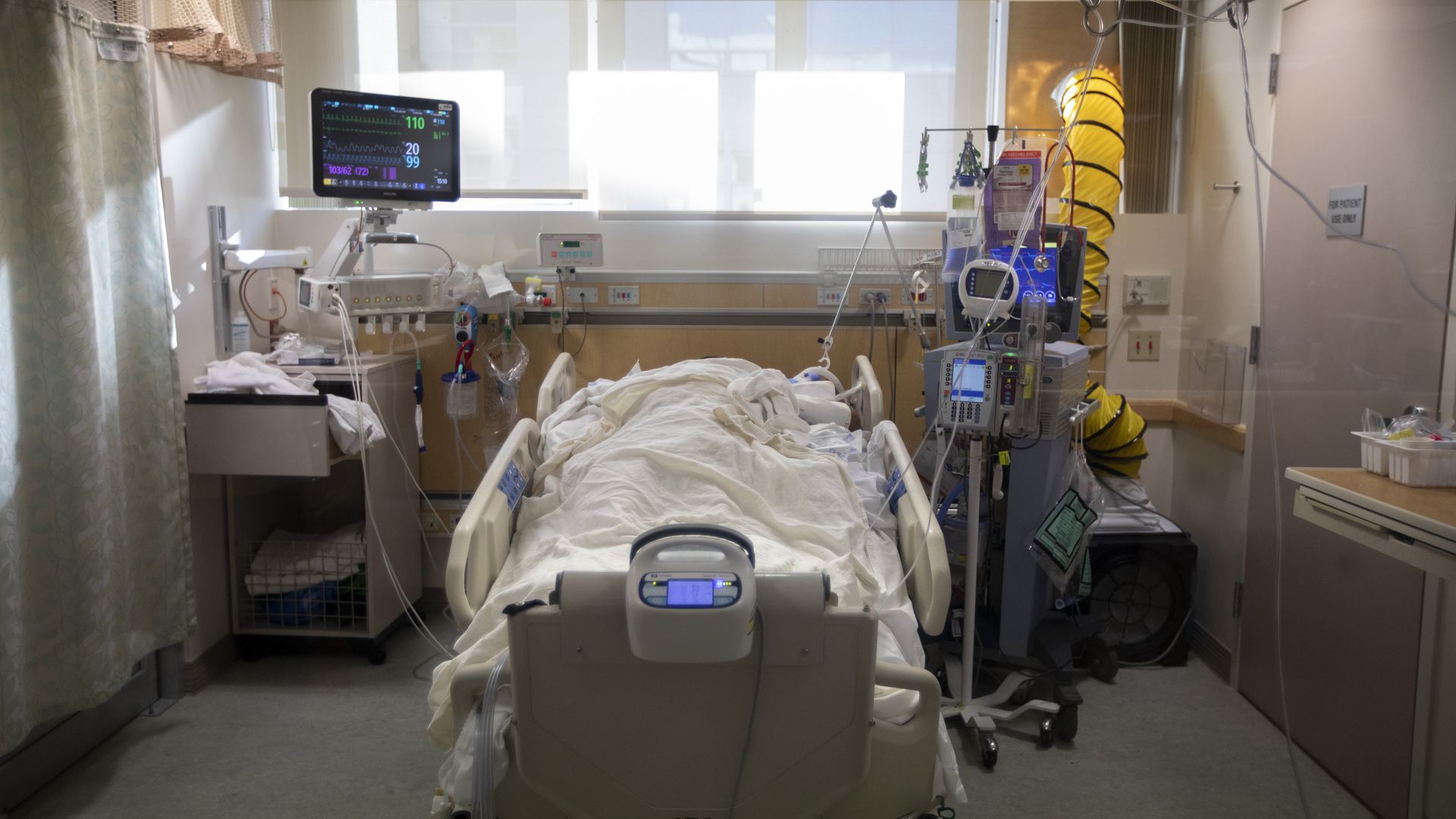| | | | | | | Presented By PhRMA | | | | Axios Vitals | | By Tina Reed ·Jul 20, 2021 | | 😙 Good morning, Vitals readers. Today's newsletter is 999 words, or a 4-minute read. Situational awareness: Senate Democrats are debating lowering the Medicare eligibility age as part of the $3.5 trillion "soft" infrastructure package, Axios' Hans Nichols reports. | | | | | | 1 big thing: The "nudge-able" and "unbudge-able" |  Data: Axios/Ipsos poll; Note: Among a sample of 295 respondents, with a margin of error of +/-5.8%; Chart: Connor Rothschild/Axios Most Americans who still aren't vaccinated say nothing — not their own doctor, a celebrity's endorsement or even paid time off — is likely to make them get the shot, Axios' Margaret Talev reports from the latest installment of the Axios/Ipsos Coronavirus Index. Why it matters: The findings are more sobering evidence of just how tough it may be to reach herd immunity in the U.S. What they're saying: "There's a part of that population that are nudge-able and another part that are unbudge-able," said Cliff Young, president of Ipsos U.S. Public Affairs. - "From a public health standpoint, they've got to figure out how you nudge the nudge-able."
Details: 30% of U.S. adults in our national survey said they haven't yet gotten the COVID-19 vaccine — half of them a hard no, saying they're "not at all likely" to take it. The big picture: Overall, Americans' concerns are rising for activities like seeing family and friends outside the home, going to the grocery store or sports events or getting on a plane. - Those concerns had subsided as vaccines became widely available. But the numbers are creeping back up after recent reports of rising infection rates and the dangers of the Delta variant.
- This trend is being driven by the vaccinated. The unvaccinated are no more concerned than they were before, which wasn't much.
Go deeper. |     | | | | | | 2. Hospital penalties could rise |  | | | Photo: Francine Orr/Los Angeles Times via Getty Images | | | | The federal government has proposed raising penalties on hospitals that do not publish prices they negotiate with private health insurers, Axios' Bob Herman writes. Why it matters: Many hospitals were not complying with the new regulation that required them to post prices for at least 300 "shoppable" services, in part because the maximum penalty was only $110,000 per year. - The federal government is proposing to raise the maximum penalty to $2 million per year for the largest hospitals.
- The agency is seeking comments on the stiffer penalties, as well as best practices for online price estimator tools that hospitals can use in lieu of posting standard charges for 300 shoppable services.
What to watch: Big pushback from hospitals. - For instance, America's Essential Hospitals quickly released a statement saying they are "disappointed the administration chose to harden its stance on price transparency."
- "More stringent penalties for noncompliance with rules whose potential effects even the administration cannot quantify is the wrong direction," they said.
|     | | | | | | 3. NIH to study long COVID in kids |  | | | Illustration: Sarah Grillo/Axios | | | | Children's National Hospital in Washington, D.C. and the National Institutes of Allergy and Infectious Disease are launching a $40 million study to examine long COVID and multi-system inflammatory syndrome in children. Why it matters: While kids have been comparatively unscathed by COVID, this is the largest study of its kind aimed at understanding the long-term impacts COVID can have on children when they do have more serious outcomes. "This study will provide us with a critical missing piece of the puzzle," said Roberta DeBiasi, chief of the division of pediatric infectious diseases at Children's National and lead researcher for this study. By the numbers: More than 3.6 million children have tested positive for COVID-19 and more than 2,800 cases of MIS-C have been reported in the U.S. - Researchers plan to look at information about long COVID's quality of life and social impact, as well as the long-term physical impact of the virus, including on the heart and lungs.
- They also hope to detail the role genetics play in the duration of the immune response to COVID-19, as well as long COVID and MIS-C.
|     | | | | | | A message from PhRMA | | People want choice and access to medicines in Medicare – not barriers | | |  | | | | In Washington, what politicians say and what they mean can be very different.
To save money, some politicians are willing to sacrifice access to medicines in Medicare. This could make it harder for seniors and those with a disability to get the medicines they need. There's a better way. | | | | | | 4. The vaccine-parent gap |  Reproduced from a COVID States Project report; Chart: Connor Rothschild/Axios Mothers — particularly young ones — are still much more reluctant than fathers to get their children vaccinated against the coronavirus, Axios Caitlin Owens writes from a new report by the COVID States Project. The big picture: Vaccine resistance among parents has decreased since last winter, but there are still wide gaps between parents of different ages and genders. - The largest gap is among white parents. This summer, 10% of white fathers said that they'd be extremely unlikely to vaccinate their children if it was available, compared with 28% of white mothers.
|     | | | | | | 5. New social determinants caucus | | Members of Congress plan to announce Wednesday a new bipartisan caucus aimed at addressing social determinants of health, starting with trying to get $153 million in new grant funding across the finish line. What it matters: While social determinants are well-established as factors in individual health outcomes, COVID's harsh spotlight on health disparities appears to have brought renewed urgency behind the issue. "One in four families in my Congressional district don't have access to high-speed internet. That's a problem. With telehealth starting to take off, if you don't have high-speed internet, you don't have access to telehealth," Rep. Cheri Bustos, D-Ill., told Axios. The caucus — co-chaired by Bustos, Reps. Tom Cole, R-Okla., G.K. Butterfield, D-N.C., and Markwayne Mullin, R-Okla. — has 20 members. - They are seeking momentum behind the Social Determinants Accelerator Act, which would allocate $153 million to local government projects targeting social determinants over the next five years.
- A version of the measure recently made it to the House floor.
|     | | | | | | 6. Conservative distrust of health experts grows |  Reproduced from Annenberg Public Policy Center; Chart: Axios visuals People who rely on conservative media have much less confidence in key public health institutions and experts, and are much more likely to believe misinformation about the vaccine, Axios' Sara Fischer reports from a new survey. Why it matters: The survey, from the Annenberg Public Policy Center at the University of Pennsylvania, finds a widening gap between Americans who trust key health institutions and those who don't. Details: The survey found that in June, 78% of the U.S. public said the COVID-19 vaccines are safe and effective, up from 74% in April. - Trust in key institutions, including the CDC and FDA are still high overall. So is overall trust in NIAID director Anthony Fauci, and overall confidence in the vaccines.
- But the more ideologically conservative that people described themselves as, "the less likely they are to believe that it is true that it is safer to get the COVID-19 vaccine" the study found.
|     | | | | | | A message from PhRMA | | People want choice and access to medicines in Medicare – not barriers | | |  | | | | In Washington, what politicians say and what they mean can be very different.
To save money, some politicians are willing to sacrifice access to medicines in Medicare. This could make it harder for seniors and those with a disability to get the medicines they need. There's a better way. | | |  | | It'll help you deliver employee communications more effectively. | | | | | | Axios thanks our partners for supporting our newsletters. If you're interested in advertising, learn more here.
Sponsorship has no influence on editorial content. Axios, 3100 Clarendon Blvd, Suite 1300, Arlington VA 22201 | | | You received this email because you signed up for newsletters from Axios.
Change your preferences or unsubscribe here. | | | Was this email forwarded to you?
Sign up now to get Axios in your inbox. | | | | Follow Axios on social media:    | | | | | |









No comments:
Post a Comment